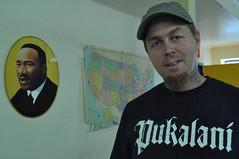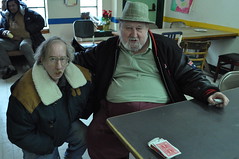 Meredith Hoffman Years after coming to East Village soup kitchens for help, Jeremy Jarvis now works as a volunteer helping those who are homeless.
Meredith Hoffman Years after coming to East Village soup kitchens for help, Jeremy Jarvis now works as a volunteer helping those who are homeless.Jeremy Jarvis has lived at opposite ends of the social spectrum. About 20 years ago – his life in a spiral of homelessness and alcoholism – he found himself standing in line at East Village soup kitchens.
Now, his is a life transformed and he works as a volunteer serving those who are in as much need as he once was.
And earlier today, as others gathered at ceremonies across New York and the nation to honor the memory of the Rev. Dr. Martin Luther King Jr., Mr. Jarvis paid tribute to the civil rights icon in his own quiet way: serving those in need.
“If I’m living with more than I need, when other people don’t have enough, I’m doing an injustice,” said Mr. Jarvis, glancing at a portrait of Dr. King in the soup kitchen of the Catholic Worker on First Street near Second Avenue.
As Mr. Jarvis gazed around the room, he recalled eating his “first bowl of soup in this room, at one of these tables” amid his troubled youth. Traveling “from handout to handout,” he found few places that consistently wanted to help him — or even cared about him.
Years later, after achieving stability and housing, he opted for a life of service — what he described as a kind of karmic payback for “this amazing life” — he has spent the past two years working as one of seven live-in volunteers who care for 14 residents in need.
Another live-in volunteer, Jim Reagan, said the kitchen’s philosophy of non-violence is grounded in Dr. King’s teachings. He recalled Dr. King’s defense of sanitation workers in Memphis the day of his assassination.
“To be a pacifist is not to be passive — it’s to be constantly struggling,” said Mr. Reagan, 55.
To Joseph Terruso, 56, who has been “in and out” of the space since 1973, the work of Mr. Jarvis and others is a source of solace.
 Meredith Hoffman Two residents at the Catholic Worker. Mr. Jarvis said of his work at the organization: “If I’m living with more than I need, when other people don’t have enough, I’m doing an injustice.”
Meredith Hoffman Two residents at the Catholic Worker. Mr. Jarvis said of his work at the organization: “If I’m living with more than I need, when other people don’t have enough, I’m doing an injustice.” “Food is the house and the house is food,” he said, eyes wide behind thick glasses. Though he last moved in because of homelessness in 2000, he still calls himself a volunteer, and prides himself in setting the table each night and helping with other chores.
Mr. Reagan said the line is fuzzy between volunteers and other residents. But some who stay with the organization, like Richie Harper, 74, say that they need all the help they can get.
“People here take care of me, they do everything for me,” said Mr. Harper, who is nicknamed “Whiskers.” He compared the work of the volunteers to the efforts of civil rights activists during the 60’s.
“They’re all Freedom Marchers, “ he said, scratching his full beard during a lull in a solitaire game.
As for Mr. Jarvis, he said that he has found his life’s mission in serving others, particularly in the East Village.
“In this neighborhood,” he said, “can we give up what we have so that others may have what they need?”



